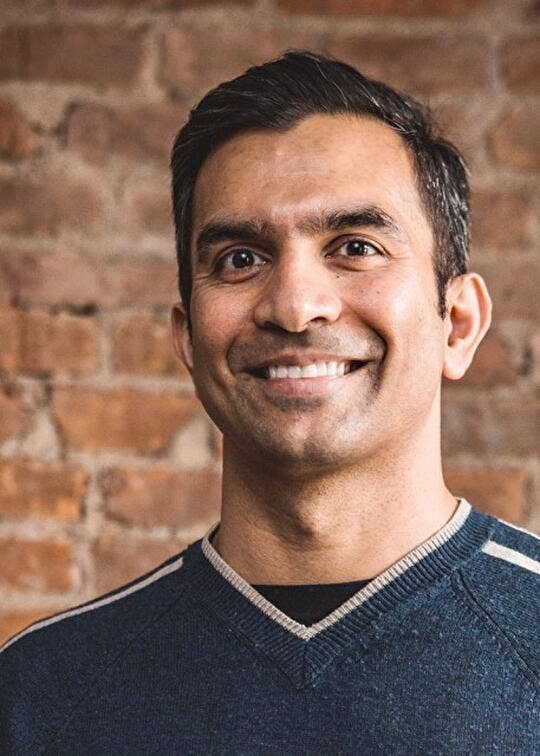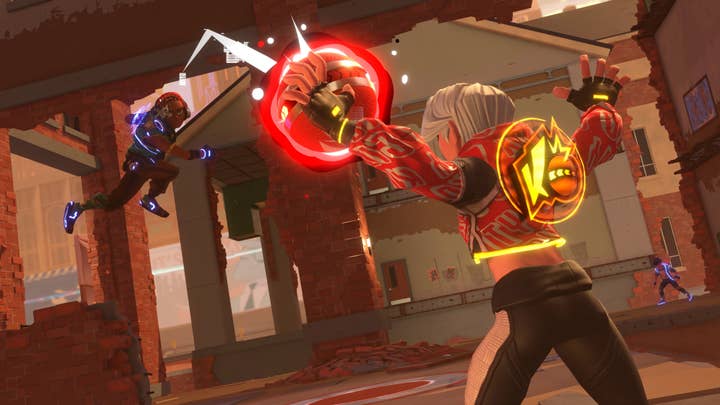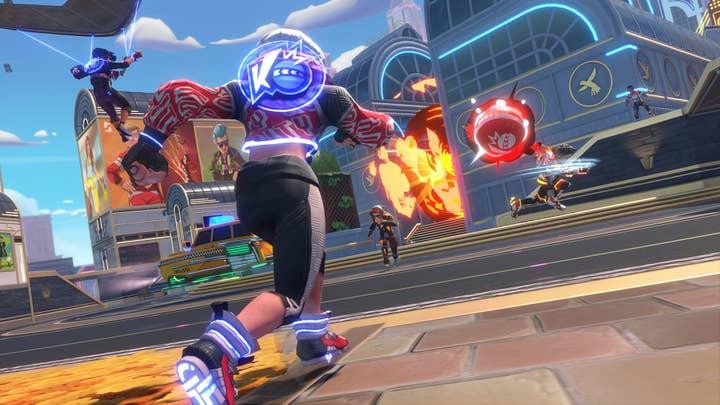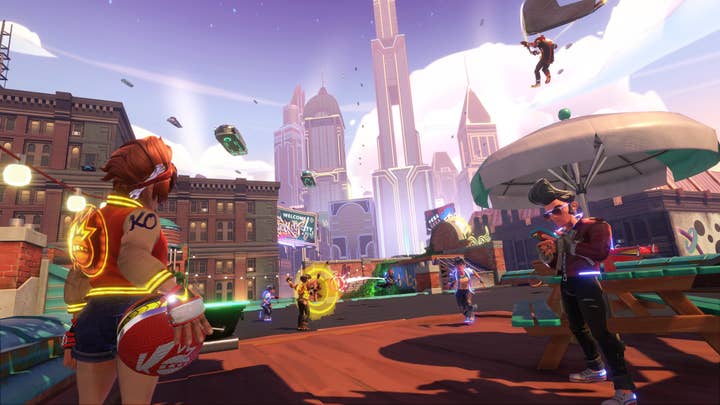One year in Knockout City | GI Live Online
Velan Studios founder Guha Bala shares what the developer has learnt in its first year of live-service
It's been quite the year for developer Velan Studios.
Just weeks after the studio's president Guha Bala appeared at GI Live: Online back in May 2021, the company released its second title, Knockout City. This was the culmination of almost four years of work in the wake of the Bala brothers founding Velan Studios in 2016 following their exit from Activision Blizzard's Vicarious Visions.
Once again, Bala took some time out of his busy schedule to discuss how Knockout City's first year in the wild has been, what Velan has learnt from the experience and what the future holds for the dodgeball multiplayer romp.
Knockout City was always going to be a multiplayer-only game, he told us. There were numerous examples of this kind of experience on the market, including Overwatch. But by the time release was approaching, many of these titles had shifted to being free-to-play, while new and similar games had launched with this model.

The Velan team settled on a $20 price tag for the game, but wanted to court an audience that was growing more and more accustomed to such an experience being free-to-play with its Block Party launch event. This saw users being able to play Knockout City without paying for ten days.
“We had to launch it at mid-price premium but we also had to one make that price barrier as affordable as possible so we went to this $20 price point that we thought was going to be effective, but then make it as easy as possible for people to get in and try it,” Bala explained.
“One of the hardest things we've found is that if you write the concept of a game, like 'I've got a game about dodgeball' and you say here's what you do, it doesn't make a whole lot of sense and it doesn't scream 'awesomeness.' Frankly we put it in front of people and they said it could be interesting, but they don't know what it meant. So we came up this mantra, together with EA, that playing is believing. You have to play it and you'll feel why. We had this premium model, we had to bring down the barriers as much as possible to try it.”
The Block Party idea was a hit, helping Knockout City hit five million players by the time the event came to a close. But the Velan team had now seen the benefit of letting people play for free, so continued to do this after Block Party with both a free trial and other subscription services.
“We still needed a way for our players to come in with low friction,” Bala continued. “So we made it a Game Pass at launch title, which is a little uncommon for EA Play type of products. That would provide a certain level of player liquidity for Xbox users. And then we offered a free trial afterwards with a level cap of 25, which would give on average about five hours. So that's plenty of play for players coming in and seeing if they like it.”
"Game Pass was helpful in North America, where we continue to have pretty decent player liquidity and a premium model. But it was not as prevalent in other parts of the world"
It wasn't all rosy though. Bala admits that while Game Pass helped make Knockout City popular in some parts of the world, this was far from a universal phenomenon.
“Game Pass was helpful in North America, where we continue to have pretty decent player liquidity and a premium model,” Bala explained. “But it was not as prevalent in other parts of the world. When we go to Latin America or most of continental Europe -- UK is a bit stronger on the Xbox side -- or Japan, Xbox at that time, was definitely underindexed quite a bit. So that wasn't really a flow for player liquidity.”
Bala also admits that the free trial, though a good idea, could have been better explained.
“The messaging was just a bit complicated,” he said. “Even though it's anyone can get in and play, it's not well understood. So maybe we were trying to make the most out of a situation where the pricing model is out of step with where the marketplace is and we're trying to make up for it.”
Knockout City is also the first service-based project that Velan has worked on, meaning that the first year after release was full of lessons the studio had to quickly learn.
“Our team needed to get its sea legs for live services and live service operations, for content deployment, for being able to do all the events and sequences and all the creative content that change the mechanics, we had to plan for that,” Bala said. “The execution of the plan went pretty well but it still takes time to build better in that area and really understand what the community wants.”
The Velan team has also introduced new mechanics like bots which make Knockout City a much more approachable game for new players.
“At first, you scratch your head and say that most players online hate bots,” Bala said. “But the reality is that bots are a really good on-ramp for brand new players. They can be effective in tutorials. In a game like ours, if you're not with friends, smart bots can be really good team mates as well.
“One of the issues we ran into -- some of these things you can only learn [once you're] live -- is that when you have lower player liquidity, sometimes you're matched, after a certain period of time, with a group who is already mid-game. You join an in-progress thing, but they might be on the losing end of a game, so it's pretty demotivating for a player coming in. These are all roles for bots, so we should have done that, but we learnt that late and implemented it as the game went live.”

When it comes to games-as-a-service, one aspect of the market that Bala really admires how mobile developers are able to soft launch a title in one region, test it to perfection, before releasing it out to the wider world. In fact, he laments the fact that this isn't possible on PC and console.
“One of the things in games-as-service that mobile developers do really well in is that they can keep their structural costs of essentially doing a soft launch for them are pretty low,” he said. “I'm going to operate a game, it'll be under brand X, it'll only be in New Zealand and you'll run it until you achieve your KPIs and then scale it up elsewhere, for example. It's very common in mobile development.
“It's actually really costly for premium console and PC development. For one, there's not an easy deliniation where you can just release something in New Zealand. Usually you're territory-wide in those things. In addition to that, maintaining the amount of content you need to push through in premium console and PC land for a game like this is quite a lot. You have high structural costs for learning and really optimising it for engagement.
“Essentially we launched it in a big premium way for a big audience to come and a lot of premium sales upfront, but without really a soft launch period in a test market where we could run it out and see whether we are hitting our long term engagement KPIs as well.”
"A community that self selects is going to be a bit different than users that are coming in from a free-to-play standpoint"
Earlier this year, Velan announced that it was making Knockout City a free-to-play release. According to Bala, the studio had a realisation that it needed to change the business model around September or October 2021. This is a sizeable change in itself, but Velan is also taking over publishing duties from Electronic Arts and its EA Partners' label for the game moving forward.
This was partly because free-to-play just wasn't “a fit” for the publisher, but EA Partners wanted to help Velan strengthen its capabilities on this front.
“We worked with them but we've had to build a small indie publishing organisation at Velan Studios because we'll own our own marketing,” Bala said. “We've owned community management from day one but that has to be extended to broader social media presence and capability as well. So there's a bunch of different areas like that we've had to build and prepare at the studio. It's taking on more responsibility for looking at the how the game is going to evolve for all our players in the geographies and making sure there's a quick and clear response line between what's happening in the community and what we can do from a live standpoint.”
Still, Velan is having to prepare for a slightly different audience. Players who have paid for the game are a different beast to those who have got Knockout City for free.
“A community that self selects is going to be a bit different than users that are coming in from a free-to-play standpoint as well,” Bala said.
“It's preparing all the systems to be able to say 'Let's understand what happens right afterwards'. The big promise that we'll make to consumers is that the game will continue to be awesome. We'll work really hard to provide awesome play environment for folks as well as a rich pipeline of new content that's coming out, but using that as a basis to really learn how free-to-play users, which will be a bit different, how they engage with the game.
“So we designed the game with a core set of mechanics and we saw that evolve through emergent play and how our teams are actually engaging with the game and how they play the game. A lot of the stuff we are doing in features we are doing is in response to that as well.”

The free-to-play transition is also allowing Velan to redouble its efforts on innovating and introducing new types of content into Knockout City.
“The number one thing on the free-to-play side is doubling down and a recommitment to an awesome variety of new content,” Bala said. “Season Six [started on June 1st] as well and we're really committed to every season introducing something new that's probably worth a little aside on Velan Studios. Something new for the audience from a fundamental play standpoint, from a play mechanics standpoint as well. A mission for our studio, why we started in the first place, is to really challenge forms of play and offer something new for players at a very basic game mechanic standpoint.
”So in operating a live service experience, the team itself really embraces that concept and with every season they say what is going to be new about the play of this game. We're going to bring that into Season Six and of course you'll see some more in Season Seven and all the way beyond. It's a really redoubling commitment to our community around live content, as well for the product.”
In addition, this shift in business model, in theory, will draw in a bigger audience from parts of the world that Knockout City hasn't previously been super popular.
"How do we continue challenging [expectations]? If we don't do that, then one of the fundamental reasons for starting [Velan] starts fading. That's a scary prospect. We don't want to let that happen"
“The switch to free-to-play will really make the game much more accessible on a broader basis, and importantly accessible to all the community's friends and social networks and all that stuff because there's such a minimal barrier to entry,” Bala said.
“We're really excited about players in Latin America coming on board, players in Asia coming on board in addition to just folks who are active free-to-play users in our Western markets as well. It's a recommitment to all of that with an awesome new line-up of content.”
Moving to free-to-play also changes what success looks like for a game. So what does success look like for Knockout City now?
“There's a certain base level of economic sustainability that we need to achieve, a certain playerbase and eventually economics that can come from that playerbase,” he said. “Our number one priority this year is KPIs around user retention and engagement, which is the lifeblood of any free-to-play title. That's all around being very player-centric and making this one of the staple social games that people will come to week-after-week, that type of thing. And then it's about player-friendly monetisation systems as well. But all that together, we need to achieve a certain minimum level of economic sustainability and then it's about really following the community and growing it over time.”
Though free-to-play is a huge shift in business model for Knockout City, this kind of an evolution has always been part of Velan Studios' ethos.
“It's really the fourth leg of our own business plan from a Velan Studios standpoint,” Bala said. “I don't have the index card with me, but Karthik and I wrote down our business plan on an index card when we started back in 2016 and it was: build an awesome team, find an idea that we're super passionate about, figure out the go-to-market strategy and then evolve the product with our community.
“We're changing the go-to-market now and then really working on evolving it as well. That's really the vision for it as well. It can really play a unique role in a player's play repertoire. It's something different. It continues to be something really unique among games out there.”

As for what the future holds for Velan Studios, Bala says the developer is going to stick to its mission statement: 'Make breakthrough games that are magic'.
“What that really means is play experiences that feel really fresh and challenge expectations; things that will be remembered for ages,” he explains. “We hope that what we make has some breakthrough and become staples for users. But just as important is our capacity to invent new and to get new ideas going to take risks that other people would shy from.
”I think if we ask for straight business analytics advice or industry analyst advice, they'd be like 'Well, here's a team that's good at a certain genre, get them to keep making more of that' because that's what's investable. There's definitely merit in that, but what it also does is result in very derivative products. So you have a slightly different variant on what's been done before or something with a twist. The worst version of that for us is a "This meets that" -- that's probably the cross between a camel and a donkey, I don't know what it is. We try to stay away from any of that stuff and then really go after what might be fresh experiences.”
In fact, it turns out that we're not that far from seeing what Velan's next title is going to look like. This game is set to be self-published, though Bala doesn't rule out working with other publishers again, depending on the project.
“The big difference between Velan this time last year and now is that we are our own publisher,” Bala said. “Adding self-publishing to Knockout City is the first step to that. We'll have a another title -- we're not ready to announce it yet -- in the upcoming months, likely early next year, as well, building on some of our core capabilities. And then we have a bunch of new things in the hopper as well.
”The big challenge is when you start getting good at something, how to then go divergent to that at the same time. So you don't want to throw it all away. We need sustainable franchises to give us the economics to keep reinvesting, but the challenge is then 'Now what? How do we now surprise players in a very different way?'
”That's what we are very much engaged in right now, not only making Knockout City successful in a live environment, getting our next game out, but also how do we continue challenging. If we don't do that, then one of the fundamental reasons for starting [Velan] starts fading. That's a scary prospect. We don't want to let that happen.”
